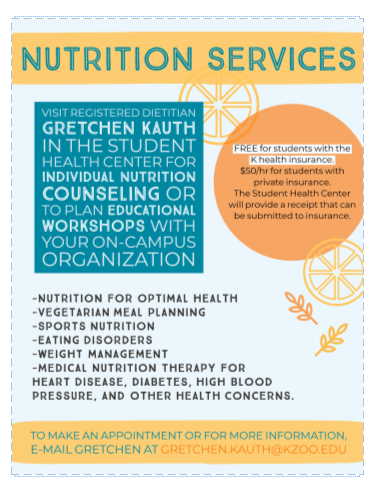What are Eating Disorders?
Eating Disorders Affect Everyone
- Eating Disorders & Men
- Eating Disorders & BIPOC Populations
- Transgender/Non-binary/LGBTQ and Eating Disorders
- Eating Disorders & Athletes
Helpful Websites
- Southwest Michigan Eating Disorders Association (SMEDA): This site provides information about eating disorders, how to get help, and a directory of local dieticians, therapists, physicians, and national treatment centers.
- National Eating Disorder Information Centre- Canada: This is the official site for the National Eating Disorder Information Centre. On this site, you will find general information on eating disorders. Additionally, you will find a guide for family and friends of a person experiencing weight and food problems.
- The National Centre for Eating Disorders UK: This site offers some great information on how to help a friend with an eating disorder.
- National Eating Disorders Association (NEDA) USA: This site contains a great amount about all facets of eating disorders. From the main page, click on “eating disorders info.”
- Eating Disorder Hope: This site provides information, resources, and education, as well as online support groups.
- 70 Resources to Support Eating Disorder Recovery: This page provides information regarding symptoms of eating disorders, resources, treatment and recovery, helping a friend with an eating disorder, and hot lines for help.
- Centre for Clinical Interventions/Disordered Eating: This website provides workbooks and worksheets for overcoming disordered eating.
K College Nutrition Services
Did you know K College has a nutritionist? See below to learn more about the services Gretchen Kauth provides to K students. If you are concerned about your physical health visit The Student Health Center.

Tips to Overcoming an Eating Disorder from Women Who Have Recovered
By Barb Small, M.A., January 1994
- Acknowledge that your behavior is unhealthy and you need to make changes. Change is YOUR choice.
- Do not wait for others to “fix” you. Take responsibility for your own recovery.
- Learn to listen to your “self.” Recognize and honor your needs and wants. Spend some quiet time so you can hear your “self.”
- Focus on feelings before, during and after you binge, purge or restrict. Whatever you are feeling is valid. Find alternative ways to resolve these feelings. Do not stuff them — express them!
- Stop comparing yourself to others. You are a unique and valuable person just as you are. Value your individuality.
- Set small goals that you can accomplish and congratulate yourself for every success.
- Focus on the present and positive aspects of your life. Let go of the past and the future.
- Become aware of your negative self-talk (i.e. I cannot do that because I am fat. I always make mistakes). Challenge and dispute that talk. Replace the negative statements with positive statements and encouragement (i.e. I have value. It is o.k. to make mistakes. I learn from my mistakes).
- Take time to nurture yourself in ways other than with food, such as a walk, a movie, a hot bath, a special present.
- Enjoy your body. Do activities you like, such as dancing, massage, yoga, swimming, biking.
- Talk to someone rather than turning to food for support. Keep talking until you find someone who is willing to listen to your feelings, thoughts, and needs.
- Start trying to appreciate different achievements in yourself and others. Work toward the point where weight and appearance are no longer something by which you rate your success. Identify goals and activities you have been putting off until you are thin, make a list and start doing them now. Appreciate who you are now and start living your life today.
- Explore your possible ambivalence about giving up these eating behaviors and your fear of living without these old coping techniques. Risk trying new behaviors, without being certain of the outcome.
- Recognize your personal rights: to say no; to express your feelings or your opinion; to ask to have your needs met.
- Be willing to accept your body, your feelings, and your needs unconditionally; to accept your “true self.”
- Keep a journal of your experiences, feelings, thoughts, and insights. This is a safe place to be honest with yourself — the journal is for your eyes only, no one else will be reading it or judging it. The journal can also help you identify your “triggers” (things that set off the eating disorder cycle) so you can prepare yourself to choose alternate strategies
- Develop a creative outlet. Take up painting, drawing, writing, dancing, and singing. No one will judge it, and it is a great outlet for expressing feelings.
- Don’t let the scale run your life. Numbers on a scale are not a value judgment on your self-worth. Give the scale away.
- A cultural ideal of beauty is unrealistic. Fight it! People come in all shapes and sizes. The concept of an ideal body is a form of prejudice, similar to racism.
- Seek professional help for guidance in your recovery. Support groups, counselors, physicians, and nutritionists all help people recovering from eating disorders.
- Relax! Be kind to yourself. Trust yourself. You can make changes.
